- Bring on the Lucie by Hallelujah the Hills - October 9, 2015
- Experiment: Two Words - July 27, 2013
- POV - July 19, 2013
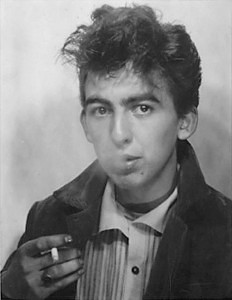
George Harrison, looking tough in this self-portrait.
I had some thoughts re the recent George-is-overrated brouhaha…but I’m lazy, so instead I dug up this obituary I wrote for The Paper That Shall Not Be Named, over a decade ago (gulp!).
The Man Who Wasn’t There
Ed Park
published: December 04, 2001
I. About 23 times a year, by his count, the narrator of Nicholson Baker’s novel The Mezzanine wonders, “McCartney more talented than Lennon?” The comparative gifts of George Harrison, who died last week at 58, could hardly provoke similar debate, yet it was his relative proficiency that made him desirable to the nascent Beatles. He could build more chords than the elder John and Paul, and knew (unlike the former) that a guitar has six strings, not four. He impressed them by playing “Raunchy,” an instrumental hit (something in the manner of Duane Eddy). He would lose his virginity during their Hamburg residency, with John, Paul, and Pete Best in the room, pretending to sleep, surreptitiously watching. At 13 or 14, he inadvertently deconstructed his first guitar before he even had a chance to play it; another time, he contrived to build his own instrument—f-holes, varnish, and all—but it fell to pieces just as he began to string it.
II. The quiet one: George barely says a word in the short film Magical Mystery Tour. He barely moves while singing “Blue Jay Way,” seated and glazed, intoning “Don’t be long” so many times that the space between the final syllables seems to disappear. (Later he would admit: “As for me, I didn’t really belong; I was just an appendage.”)
Producer George Martin, in his memoir of the Pepper sessions, dubbed him the Third Man. Beatle John called him, not unadmiringly, “the invisible man.” Ringo felt George “didn’t want to be there” for the filming of A Hard Day’s Night. Despite George’s fleet-footed presence (and his winning coat-over-turtleneck ensemble—Harrison more attractive than McCartney?), his patent shyness makes him seem saturnine compared to his mates. “You can be replaced,” a professional trendsetter tells him. “I don’t care,” he replies.
He was wildly famous but private, keeping to his estate, the one with gardens and artificial lakes and a gnome-filled maze: the guitarist in his labyrinth. He was also nominally indistinct. Two names that people very close to me have confused him with since Friday: Harrison Ford, George Hamilton.
He would later recall one Liverpudlian entrepreneur, seen in childhood: “a bloke in handcuffs and chains inside a sack, trying to escape. There were always people doing that kind of thing—the Houdini syndrome.”
Pseudonyms used by George Harrison: Carl Harrison, George O’Hara, L’Angelo Misterioso.
III. The first club the Beatles played in Hamburg was the Indra. In a few years Harrison would walk the razor’s edge in earnest. The unlikely catalyst for his deep attraction to Indian music and spiritualism was some sitar foolery in the decidedly unserious, mildly xenophobic Help! He was only 24 when he conceived the East-eats-West of “Within You Without You” for Sgt. Pepper, a decrepit 28 when he released his sprawling solo debut, All Things Must Pass.
At Strawberry Fields last Friday night there was the inevitable sing-along, under a bright moon and with small leaves falling slow as snow. Mourners’ voices found the middle range and stayed there: the faster songs like some parody of death metal, the ballads like anonymous plainsong. This ritual will happen twice again, little hedges against oblivion, before it all becomes the music of ghosts.


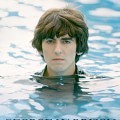
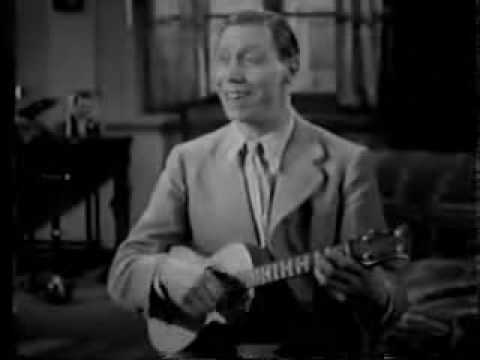
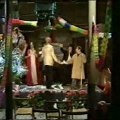
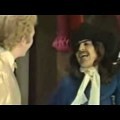

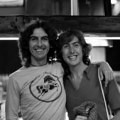

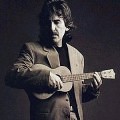
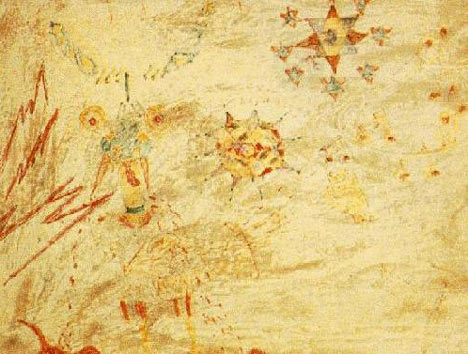
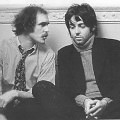
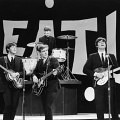
Just beautiful.
Ed, this is a hell of a line: “This ritual will happen twice again, little hedges against oblivion, before it all becomes the music of ghosts.”
One of those things you read and immediately think, “Yeah. That’s it. Exactly right.”
Got any other hidden Beatle gems? Don’t hold out on the Dullblog. 🙂
I agree, this is a lovely tribute to George and his music. On the discussion about George’s contribution to the Beatles, I think the age differences are important to keep in mind. John was two years older than Paul, who was two years older than George. In the teens and twenties a couple of years means a lot, and I think this helps explain why George blossomed a little later than John and Paul.
Here’s a 1970 Lennon quote that touches on this, and on what George learned from John and Paul:
“George has not done his best work yet. His talents have developed over the years and he was working with two fucking brilliant songwriters, and he learned a lot from us. I wouldn’t have minded being George, the invisible man, and learning what he learned. Maybe it was hard for him sometimes, because Paul and I are such egomaniacs, but that’s the game.”
[from an interview with Jan Wenner]
“George hasn’t done his best work yet” – well actually he had by that point. Looks like John wasn’t the only one who expected more and better from George. Oh well.
Also, sorry to nitpick nancy, but as you say, age difference is important at a young age: John was 20 months older than Paul, and Paul was just 9 months older than George. 29 months is much different than 48, but I get what you’re saying.
When looking at an artist’s output, it’s very easy to think of them as if they were a kind of machine, and that if they produce work that is lesser, to judge them overharshly. “What happened? Did they forget? Do they not care anymore? Were they not paying attention?”
But an artist is not a machine, and masterpieces are not simply their own doing. If it were up to them, they’d always be at top level, because that’s when it’s most fun (and lucrative, and flattering). But a masterpiece is better seen as a sublime, unpredictable combination of talent, craft, personality, timing, even history.
Most of the material on ATMP was created during the period 1966-70, when George was part of the most creative, most challenging, most “in the groove” group in the history of pop music. If he never equalled that output, well, nobody else has, either.
The Beatles were in tune with the 60s to an almost supernatural degree. Had they stayed together they might have been able to keep that up, but once split, each of them succumbed to the excesses of their character, both as artists and people. It happens.
Each produced about two LPs-worth of great solo material, and then began to recycle. It’s not that George only had 2 LPs worth of great solo stuff that’s surprising–it’s that J/P/G all seemed to run dry after about the same amount; this after becoming three very different people living three very different lives.
Good catch on the age differences, Craig. I do think the differences mattered, and are part of the reason George was often treated as a “younger brother” for good and bad by John and Paul.
On the solo careers and why they’re often considered disappointing, Michael’s point about the Beatles working at a level no one else has matched is right on. That was a crazy, unreproducible dynamic, and it must often be/have been misery to haul the baggage of that kind of expectation around a solo career.
I’d add that it’s very hard to work at top level for years. The Beatles pushed themselves very hard, and by 1969 they were frankly tired of the dynamic and of working flat out. And working flat out with each other, at least for John and Paul, seems to have been incompatible with having a mature romantic relationship.
Michael, I disagree that each Beatle had only two solo albums of high quality. I think George’s last album, “Brainwashed,” is very good, and I’m fond of much of “Walls and Bridges” and “Double Fantasy.” I enjoy pretty much all Paul’s stuff from the 70s, consider the 80s his Lost Decade, and think he got things going again starting in the 90s. “Chaos and Creation in the Backyard,” “Memory Almost Full,” and “Electric Arguments” I think are quite good.
It IS true that the earliest albums are the most Beatlesque, though. Makes sense.
“Working flat out with each other, at least for John and Paul, seems to have been incompatible with having a mature romantic relationship.”
Wow. Really interesting comment, and one that seems so true. John and Paul really were one-man men and then one-woman men. It’s odd, when you think about it how alike they were on that, in focusing everything on the Lennon-McCartney dynamic until it fell apart, and then they focused everything on the John-Yoko and Paul-Linda dynamics.
Whereas George seems to have had difficulty establishing a lasting and deep human connection with women, including both of his wives. Apparently he cheated repeatedly on both of them throughout both marriages, and Olivia gave this sad comment recently about how sometimes she felt that she was as replaceable to George as the furniture. That’s not what I’d call a mutually satisfying marriage. And even his closest male collaborators — Eric Clapton and Bob Dylan — were never close songwriting collaborations. George and Bob wrote their songs for the Traveling Wilburys separately.
Perhaps where George excelled at connecting with God, he wasn’t always so good at the one-on-one in a deep and meaningful way.
I’m with Nancy on Paul’s solo work. McCartney, Ram, Wild Life, Band on the Run, Venus and Mars, McCartney II …. (then a long rough stretch) until we get to Run Devil Run, Flaming Pie, Chaos and Creation and Electric Arguments. That’s a great quirky body of work, even if he hadn’t been a Beatle.
I’m less up on George’s late-in-life albums, and of course we’ll never know how John’s work would have changed.
— Drew
“it must often be/have been misery to haul the baggage of that kind of expectation around a solo career.”
Boy, you’re gonna carry that weight
Carry that weight a long time!
Nancy, what I meant by “2 LPs worth” was 20-30 songs. I think each solo Beatle has produced about 20-30 songs that approached their work as a Beatle. The number of LPs they’ve produced to get to that number is a difference in working method and, regrettably, lifespan.
McCartney releases 50 songs to get one Beatle-quality one; John and George wrote 10, and released five to get that one.
As ever, YMMV.
“McCartney releases 50 songs to get one Beatle-quality one; John and George wrote 10, and released five to get that one.”
I’m not entirely sure I understand this, but I think I get it. Ok so you’re saying for every great song Paul wrote, he had 50 that weren’t great and that for every great song John/George wrote, they had 5 that weren’t great? I don’t want to go off on this bc I might be misunderstanding what you’re trying to say. But I think I entirely disagree with that you judge as great, Beatle worthy songs. George wrote a couple good songs, and they were either written during his Beatles tenure and/or explicitly plagiarized. Are you saying he wrote 10 great songs after 1970?? I guess I agree with John having 10 Beatle worthy songs. But to me, you are over qualifying George to an amazing degree.
Opinions will differ, Craig, but I think one can extract 10 Beatle-worthy songs from George’s solo work. And remember, he was able to write for 20 more years than Lennon, so their productive equivalence comes from that.
Off the top of my head:
Blow Away
The Light That Has Lighted The World
When We Was Fab
All Those Years Ago
Give Me Love…
Beatles songs are great because you had four really wonderful guys working together on them. Imagine “Come Together” without McCartney’s bass line, for example.
Fantastic piece. Thanks for sharing these thoughts.
Who doesn’t love David Bowie singing George Harrison’s “Try Some Buy Some” by way of Ronnie Spector?
http://www.youtube.com/watch?v=ig5bjPls2ls
Not me.
Hologram Sam
Wonderful piece.
How are we coming up on the 20th anniversary of George’s passing? I still remember leaving work early in tears (coworkers thought I was bonkers) and heading to the only place in NYC I knew I would find like minded folks. It was comforting to stand in that circle and sing.
I am not looking at all forward to repeating this ritual anytime soon.
Yes, in my book George is more attractive than Paul.
Even in a post about his death, why do people insist on muckraking and banging on about George not working with his wives and commenting on his relationships?
The mind boggles.